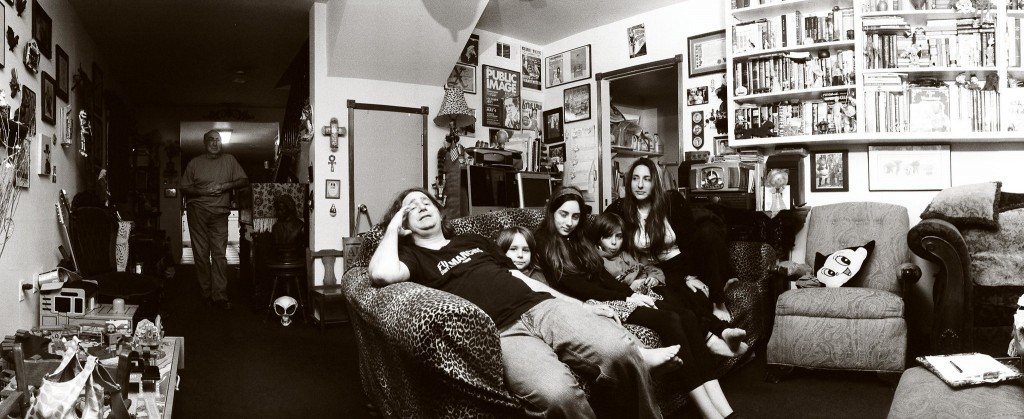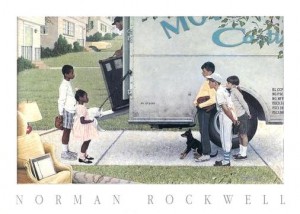
He’s not just the lead singer of the Adolescents, the legendary Orange County, California, punk rock band, he’s also a loving husband and father of three children: Mia, 14, Nico, 12, and Dario, 8. Now he’s featured alongside other punks-turned-dads, like Jim Lindberg of Pennywise and Ron Reyes of Black Flag, in the intimate new documentary “The Other F Word”. Tony Brandenburg, aka Tony Adolescent, sat down with DadWagon at South by Southwest last month in Austin–while his daughter Mia, 14, sat nearby–for a conversation about being a good father, surviving the death of a child, and why his seminal song “I Hate Children” doesn’t mean what you think it does.
Q. Thanks so much for speaking with us. Let me start with something that came up a lot in “The Other F Word”: What was your own childhood like?
My father left when I was very young, and my stepfather came with a lot of baggage. The role models that I sought out were my grandfather, and later on in my teen years, my friend Eddie Egan’s father, and [Adolescents bandmate] Steve Soto’s father. I studied these men: how they interacted with children, the way they were nonjudgmental with me. I had a lot of destructive tendencies back then. And these men, instead of berating me, they just did what they did so well, which was to be, you know, parents.
I learned first and foremost that men don’t walk away from their children. I feel very strongly about it to this day. You can dislike a spouse or partner, but it should never be at the expense of the relationship with the child, because the child needs that nurturing, that support.
Did your father leave because of a bad relationship?
You know, I found my father when I was an adult, shortly before he passed away. I asked him, what happened? He didn’t really have an answer. More than anything, before he passed away, he just asked for forgiveness. Of course, I can give him that. As an adult, I can’t spend the rest of my life carrying around the weight that I was a lesser person than I am. So, you know, I cut bait and let that go. (More on DadWagon.com: Take Your Daughter a Thousand Miles to Work Day)
The more I experience fatherhood, the more I actually pity those absentee dads.
Yes, exactly. Because he found out that he missed everything. As my daughter was born, he knew that I wasn’t going to take my newborn and fly out to see him–by this time he was dying of emphysema—to fly her out to Florida for a family reunion. That just wasn’t going to happen.
How old were you when he left?
I was four. He was a very bitter, nasty, angry horrible person with this situation. When I started to head into my teen years, about 12 or 13, I reached out, and he actually pulled up stakes and moved rather than respond. He was trying to not pay child support. My mother, though, was past the point of child support. She said, “your son needs your help.” And he left. That was his response. There was two ways to live life at that point: Either I can be that person, or I can be this person.
How much was your music with the Adolescents inspired by that trauma in your life?
When I started up [in music] I had realized that everything that middle-class, white Orange County had to offer was not something I could have. People were saying horrible things about my mother, a single woman with five children. So when I got into punk rock, I was already not part of what they are. I had to reinvent myself as a human being. (More on DadWagon.com: Top 10 Rock Songs Rife With Shoddy Parenting)
Is there any conflict between being a punk rocker and being a good parent?
When Mia was born, we went to the zoo with Brett Gurewitz [of Bad Religion] and his wife and children. Here’s this mom with bright pink hair and she’s having this conversation about formula and diapers and breastfeeding. I was starting to see past the punk rock uniform–whatever that is–and seeing that parents are parents. You either support your family or you don’t.
Has the judgmental mindset that you were burned by as a kid really gone away?
No. We had a birthday party and I was the ringleader of the kids, in a way, and the comments were, “Wow, Tony really handles the children well.” And I wasn’t sure whether to interpret that as “Wow, good job,” or “Wow, we didn’t expect that he would be able to.”
A lot of fathers are patronized, but you must get it double because you’re not just a father, you’re a punk rock father.
Right, they come to the table with a perception of who I am and what I am. They have these recorded documents, my albums. They say, “Well, look at this—he hates kids.” They don’t take my records for what they are: pretty bold statements by a child, saying I can’t breathe. Those records are me trying to express myself, explain what’s going on in my world. (More on DadWagon.com: A DadWagon Wedding: Theodore Gets Hitched)
I asked this question when I interviewed Bambu, an L.A. rapper whose music also has some tough messaging: how do you explain your music to your kids?
They’ve asked about stuff. And I’ve explained, oh well, this song is a story. “I Hate Children” was a story that I literally heard on a bus. It was a snapshot of a man saying to his wife–with his children there crying–that he hated children, can’t stand them. And this was the same message that my father had given me. When I expressed that, people didn’t understand where that was coming from. I wasn’t saying this was me. I’m mirroring something that I’m seeing right now. This is what is going on in my life.
I’ve explained to [my kids] that I had a brother who committed suicide. I had a brother who was murdered… My family history isn’t just written, it’s also recorded in music. So they have an understanding of what the songs are, who these people were, how it relates to them, why I can be very protective, why I want them to talk to me and not to close the door.
You’re not just a father: you’re also an elementary school teacher who has worked a lot with Special Education students.
It was a conscious choice [to become a teacher], because of what I’d been through. In this population with severe disabilities I saw a kinship. These were children that were labeled as being autistic, as having serious emotional disturbances. They were trying to communicate in the only medium and modes they had what was going on in their lives. And I felt I could help make a positive change in helping them bridge some of the things that were going on in their lives. (More on DadWagon.com: Why Are They Killing Public Schools?)
I want to ask you about something incredibly difficult that came up in “The Other F Word”: the death of your first child (Anabella, who was stillborn).
We were devastated. Mary had two miscarriages before Anabella and more after that. This happened in the early 90’s, but I don’t think you ever recover from that. I just… try to remember that not all dreams are realized.
As well-meaning as people would be–“You’re young, you can try again.”– I don’t think they realized that we’re not talking about some other child. We’re talking about this child who died.
Now that you have three children and a career, what’s it like touring with The Adolescents?
Steve [Soto] and I sit down and make that work around our schedules. We don’t do things on children’s birthdays. My wife and I celebrate our anniversary every year in late August. Those are lockout days.
Does your music change to reflect the life stages you’re going through?
Yeah. All that stuff is reflected in the last couple albums. “OC Confidential” [2005] was really a document about the loss of my brothers. And “The Fastest Kid Alive” [2010] is about what has been going on in the war atmosphere of the last few years.
Final question—this one for Mia. Your dad is a legendary punk rock singer. But as a teenager, do you still think your father is uncool?
Mia: I don’t think he’s uncool.
Tony: Sometimes she doesn’t understand what I’m doing or where I’m coming from. She lets me know.
Mia: It’s just that he says what he thinks, and that sometimes can be embarrassing.
Tony: Yeah, I just put it right out there. Or I let the f-bombs slip out. In the middle of the store.


